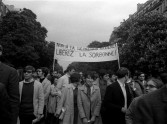
Recollections and Revolutions.
Two Films by João Moreira Salles
The dynamic and diverse body of work of João Moreira Salles (b. 1966) as a documentary filmmaker defies easy categorization, but his earlier trajectory touches on many of the most salient modes and traditions in the genre. Salles began writing scripts for television in the 1980s. In 1987 he directed the feature length China, o Império do Centro (China, the Empire of the Center) and was a screenplay writer for Krajcberg, o poeta dos vestígios (Krajcberg, the Poet of Vestiges), directed by his brother, Walter Salles. The latter project foreshadows a later sequence of intricate and sensitive portraits of individuals at work. Also in 1987, Walter and João Moreira Salles founded Videofilmes. This production company, based in Rio de Janeiro, has played a key role in reviving Brazilian film. Unusual for a Brazilian filmmaker at the time, Salles continued his exploration of travel and international themes in Blues (1990). After a hiatus from filmmaking, in 1998 he co-directed with Arthur Fontes the series Futebol; the sport is one of his lifelong passions. The following year, with Kátia Lund, he co-directed Notícias de uma Guerra Particular (News from a Private War), on the conflicts and victims of the war between police and drug traffickers in Rio de Janeiro. Salles continued to work as director for television projects. His career took a turn toward a more evocative form of filmmaking with the documentary Nelson Freire (2003). That film’s restrained style reflects the introspection of the great pianist that serves as its subject. A more direct cinema approach also informs Entreatos (2004), on a very different subject: the consummate political animal Luiz Inácio Lula da Silva. Salles and his crew follow the charismatic candidate on the run-up to his first election as Brazil’s president.
Salles also acted as a producer in several of the landmark films by the great documentarian Eduardo Coutinho. Coutinho died in February of 2014, while in the midst of filming a documentary with Brazilian students about their experiences and aspirations. With Jordana Berg, another longtime collaborator of Coutinho’s, João Moreira Salles completed the film, released in 2015 as Últimas Conversas (Last Conversations).
During his visit to the Harvard Film Archive, João Moreira Salles will present and discuss two of his finest films, each an insightful and introspective remembrance of things past that explores documentary cinema as an inherently personal mode of filmmaking, inherently shaped by its maker with an intimacy and immediacy all too often occulted. Santiago and In the Intense Now offer profoundly cinematic history lessons that show film to be both a window—looking out with perspicacity over the world, and over the past—and a mirror that reflects its maker and the spectator, revealing the limits of their vision. – Bruno Carvalho, Professor of Romance Languages and Literatures, Harvard










